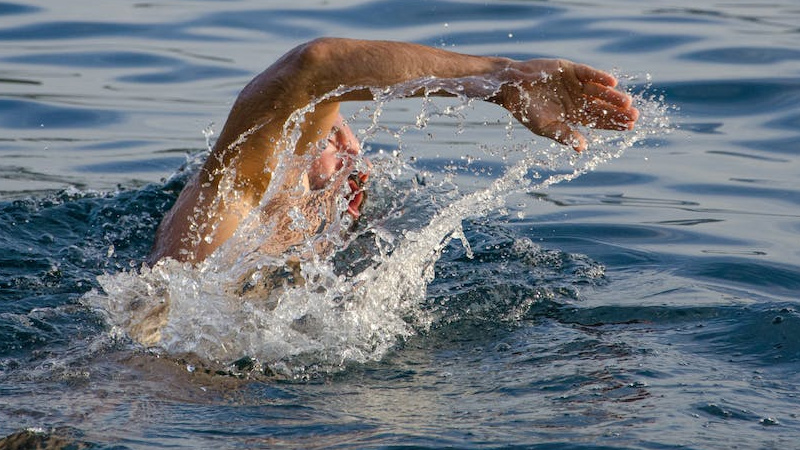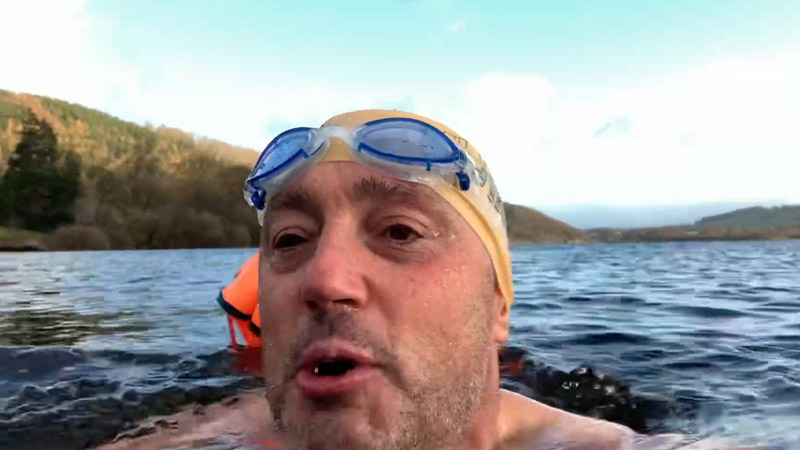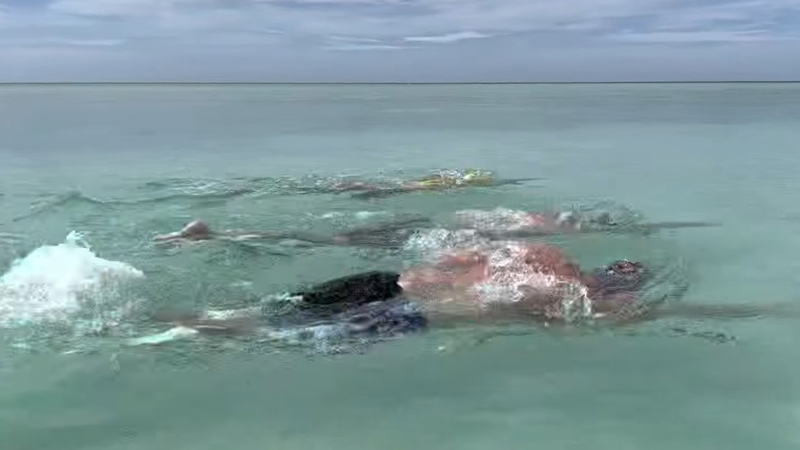Swimming in cold water is an exhilarating experience, especially on a scorching summer day. Yet, it’s not uncommon to wonder whether such a refreshing dip can lead to a fever.
Contrary to popular belief, swimming in cold water itself does not typically cause a fever. Fevers usually result from infections, be they viral or bacterial.
In this exploration, we’ll delve into the relationship between cold-water swimming and fevers, addressing the key factors that influence this connection.
Understanding how to enjoy cold-water swimming safely and minimize the risk of fever is essential for those who relish the icy embrace of nature’s aquatic wonders.
What Is Fever?
Fever is a temporary increase in body temperature, typically in response to an infection or illness. It is a natural defense mechanism, as many pathogens thrive at normal body temperatures.
The hypothalamus, a region in the brain, regulates body temperature and can reset it higher during fever. This prompts various physiological changes, including shivering and an increased heart rate, to generate and retain heat.
While fever can be uncomfortable, it serves a crucial role in the body’s immune response, as higher temperatures can inhibit the growth of certain pathogens and stimulate the immune system.
Fever is a common symptom of numerous ailments, from the common cold to more serious infections.
Do You Get a Fever After Swimming in Cold Water?
Swimming in cold water can be an exhilarating and refreshing experience, especially during hot summer days. Many people wonder if they can get a fever from swimming in cold water.
The short answer is that swimming in cold water alone is unlikely to cause a fever. Fevers are generally caused by viral or bacterial infections, not by exposure to cold water.
Here’s a more in-depth explanation:
Cold Water and Immune System

Swimming in cold water may temporarily lower your body’s core temperature, which can affect your immune system. A weakened immune system can potentially make you more susceptible to infections.
However, the cold water itself does not directly introduce pathogens (viruses or bacteria) into your body, which are the primary culprits behind fevers.
The Myth of “Catching a Cold”
It’s a common misconception that swimming in cold water, or simply being cold, can cause you to “catch a cold.” Colds are typically caused by viruses, most commonly rhinoviruses.
Exposure to cold weather or cold water might make you more vulnerable to infections if your body is already stressed or if you’re spending time in close quarters with other people who are infected. But the cold itself does not cause the illness.
Hypothermia
While swimming in very cold water is unlikely to cause a fever, it can lead to a condition called hypothermia.
Hypothermia occurs when your body loses heat faster than it can produce heat, and it can be life-threatening if not addressed.
Symptoms of hypothermia include shivering, confusion, fatigue, and a drop in body temperature. Hypothermia can weaken your immune system, but it is distinct from causing infections or fevers.
Preventative Measures
To minimize the risk of getting sick after swimming in cold water, ensure that you warm up properly before entering the water, limit your time in very cold water, and dress appropriately to avoid hypothermia.
Additionally, practicing good hygiene, such as showering after swimming and avoiding contact with sick individuals, can help prevent infections.
Is It Normal to Have Fever After Swimming?
It is not normal to have a fever after swimming. Fevers are typically a sign of an underlying medical condition, often caused by infections such as viral or bacterial illnesses. Swimming itself, whether in cold or warm water, should not directly cause a fever.
However, there are some rare circumstances where a person might experience a fever-related condition after swimming, but this would be due to specific causes, not the act of swimming itself.
Some potential scenarios include:
Swimming in Contaminated Water

If you swim in water that is polluted or contaminated with harmful bacteria, viruses, or parasites, you could contract an infection that might lead to a fever.
This is more common in natural bodies of water like lakes, rivers, or ponds, but proper water treatment and maintenance in swimming pools typically minimize this risk.
Exposure to Cold Water and Hypothermia
As mentioned in the previous response, swimming in very cold water can lead to hypothermia, which can weaken your immune system and make you more susceptible to infections. While hypothermia itself does not cause a fever, it can indirectly contribute to illnesses.
Allergic Reactions
Some people may have an allergic reaction to chemicals used in swimming pools, such as chlorine.
Allergic reactions can lead to symptoms that might be mistaken for a fever, but it is not an actual fever. These symptoms can include skin rashes, itching, and discomfort.
Overexertion or Dehydration
If you overexert yourself during swimming, it can lead to physical stress on your body, potentially causing symptoms like fatigue, dehydration, and an elevated body temperature. While these conditions may resemble a fever, they are not the same.
How to Prevent Fever After Swimming in Cold Water

Preventing a fever after swimming in cold water primarily involves taking steps to stay warm, maintaining good hygiene, and avoiding potential sources of infection.
Here are some tips to help prevent fever and ensure a safe and enjoyable cold-water swimming experience:
Proper Warm-Up
Before you take the plunge into cold water, engage in some light physical activity to warm up your body. This could include jogging, jumping jacks, or even brisk walking.
A proper warm-up helps raise your core body temperature, making the transition into cold water less shocking for your system.
Wear Appropriate Gear
Invest in high-quality cold-water swimming gear, such as wetsuits or thermal swimwear. These specialized garments are designed to provide insulation and retain body heat, ensuring you stay warm during your swim.
Limit Exposure Time
If you are not accustomed to swimming in cold water, it’s essential to limit your exposure time. Start with shorter sessions and gradually increase your swim duration as your tolerance builds.
Stay Active
While in the water, keep moving and swim regularly. Physical activity generates heat and helps maintain your body temperature. Treading water or performing gentle strokes can be beneficial to stay warm.
Dry Off and Warm Up Quickly
After your swim, dry yourself off thoroughly with a towel, and change into warm, dry clothing. Seek shelter in a heated area if possible to help your body recover from the cold exposure.
Hot Drinks
Enjoying a hot beverage, like herbal tea or a warm soup, can be highly effective in raising your core body temperature after cold-water swimming. The warmth will help your body recover and feel more comfortable.
Hydrate
Maintain proper hydration by drinking water, but avoid consuming very cold beverages immediately after swimming, as they can further lower your body temperature. Opt for room temperature or warm fluids.
Good Hygiene
Rinse off with fresh water immediately after swimming to remove any contaminants or impurities from your skin. This practice can help prevent skin irritations and reduce the risk of gastrointestinal infections.
Check Water Quality
If you’re swimming in natural bodies of water, be aware of water quality advisories and avoid areas with known pollution or bacterial contamination.
In swimming pools, ensure that the water quality is maintained within appropriate limits, with the correct chlorine and pH levels.
Avoid Sick Individuals
Steer clear of swimming or close contact with individuals who are visibly unwell. Viral and bacterial infections can spread easily in close quarters, making avoidance of sick individuals a key preventative measure.
Build Tolerance Gradually
If you’re new to cold-water swimming, it’s wise to build your tolerance gradually. Start with shorter sessions in milder temperatures and progressively work your way into colder waters as your body adapts to the cold.
Know Your Limits
Pay attention to your body and its signals. If you start to feel extremely cold, or experience uncontrollable shivering, or confusion, it’s crucial to exit the water and seek warmth immediately. Ignoring these early signs of hypothermia can be dangerous.
FAQS
Can swimming in a cold pool cause a fever?
Swimming in a cold pool itself does not typically cause a fever. Fevers are usually associated with infections, not water temperature.
What should I do if I have a low-grade fever after swimming?
If you experience a low-grade fever after swimming, monitor your symptoms and rest. It’s more likely a sign of an underlying illness than a direct result of swimming.
Can a toddler develop a fever after swimming?
Yes, toddlers can develop a fever after swimming, but it’s more likely due to exposure to infections or cold air than the act of swimming itself.
Is it normal to experience fever and chills after swimming?
No, it is not normal to experience fever and chills after swimming. This may indicate an illness or exposure to cold air after swimming.
Can swimming in cold water make you sick?
Swimming in very cold water can weaken your immune system, making you more susceptible to illnesses, but it doesn’t directly cause sickness.
Can I get a fever the day after swimming?
While it’s rare for swimming to directly cause a fever, you might experience fever symptoms due to infections the day after swimming, especially if exposed to sick individuals.
Wrap Up
The notion of developing a fever solely from swimming in cold water is a misconception. Fevers typically arise from viral or bacterial infections rather than cold-water exposure.
Cold-water swimming, while invigorating, should not be a direct cause of illness. By following safety measures, like wearing appropriate attire, warming up, and practicing good hygiene, individuals can significantly reduce any associated risks.
Any fever that does occur after swimming is more likely a consequence of indirect factors, such as pre-existing infections, weakened immunity due to cold exposure, or exposure to sick individuals.
Thus, the key to a safe and enjoyable cold-water swim lies in understanding these factors and taking proper precautions.







